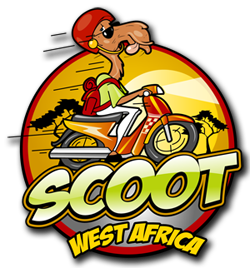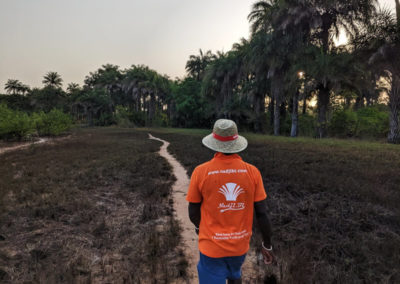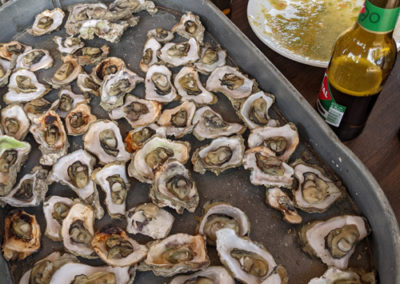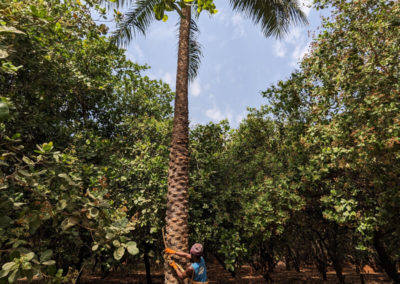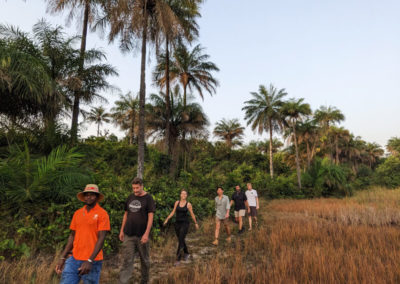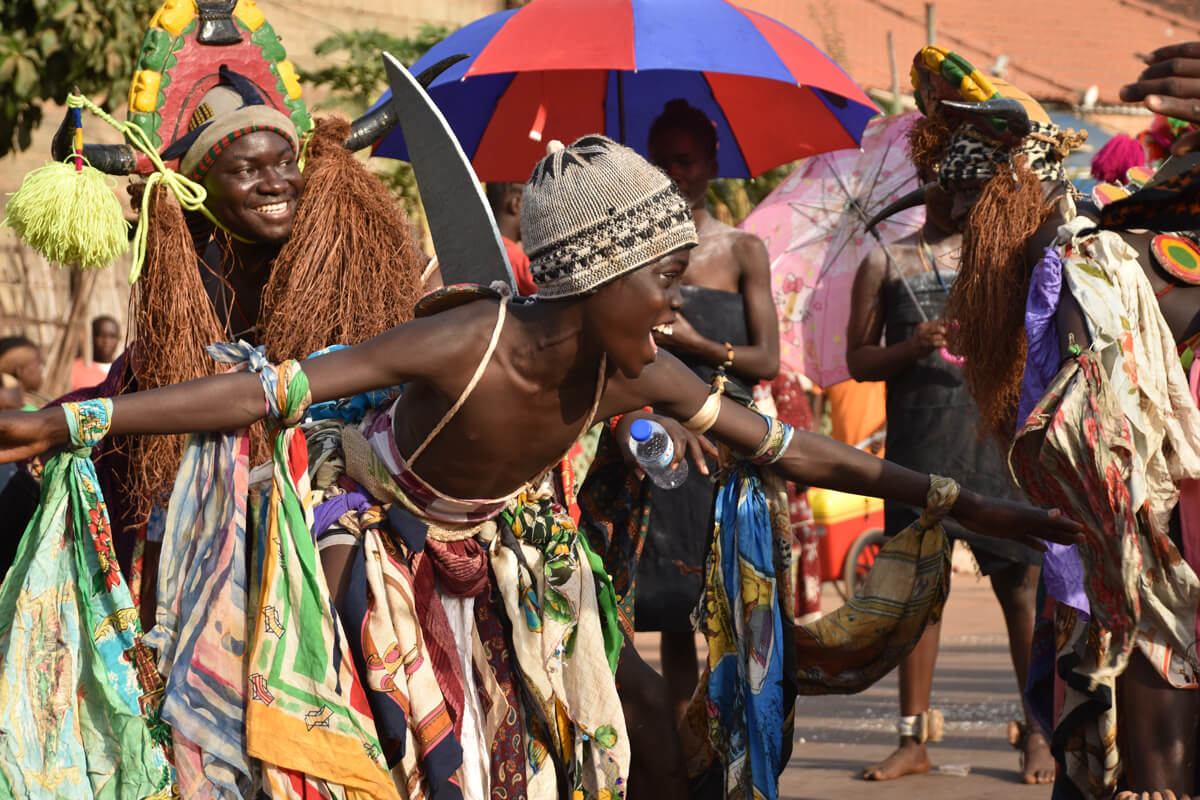
Boa Festa! Two week Trip from Dakar to Guinea-Bissau
Take our Jaam Rek trip and add a week in Guinea-Bissau, a leading candidate for our favorite country in West Africa. We will party in the capital before exploring the Bijagos Islands, an archipelago of rarely visited matriarchal societies, untouched beaches and cerulean water.
Every year we run a trip to Guinea-Bissau for Carnival. This usually takes place some time in February or March. Have a look at the available dates at the bottom of the page. Carnival in Bissau is not to be missed!
Itinerary
Please see our philosophy on itineraries. This itinerary is flexible and not necessarily chronological. Changes can be made depending on local conditions, spontaneous discoveries that can happen on the road, and the considerations of the group. Instead of a day-by-day breakdown we will share some of the highlights of the trip and then explain what to expect in terms of weather, food, lodging etc.
La Petite-Côte
Our departure point is La Somone, a small town on the Petite-Côte (the small coast) of Senegal. It is about 35 kilometers south of the Dakar airport. Since relocating in 2017, the Dakar airport can hardly call itself that anymore. It is located nearly 60 kilometers south of the capital city — one reason that we have moved our start point further south.
But it’s not just for the sake of convenience that we relocated our start point. La Somone is famous for its lagoon, an estuary that borders a magnificent stretch of beach. There are water activities galore, accessible walks and hikes and lots of bars and restaurants.
You should plan to arrive in La Somone by the night before the trip. When possible, we will have a pre-departure orientation that evening, most likely at dinner next to the ocean with a view of the sunset and possibly some local surfers.
Dakar
Cosmopolitan Dakar is one of West Africa’s cultural and commercial capitals. Beachside boulevards, all-night sabar drum parties and nightclubs, kaleidoscopic fabrics and fashion, and delicious Senegalese food are a few of the things you will find in this city situated on the Atlantic Ocean. Dakar is not included as part of this tour, so if you would like to visit the city we recommend adding a few days to the beginning or end of your trip (the end is ideal on any trip where we return from the Casamance via the overnight ferry).
Sine-Saloum Delta
Senegal’s beautiful delta region offers stunning rides through salt flats, palm groves and plains of baobab trees. Framed by the Atlantic Ocean to the West and the dry scrublands to the east, the delta is an intricate network of crisscrossing waterways and mangroves, with the Saloum River running through the heart of it.
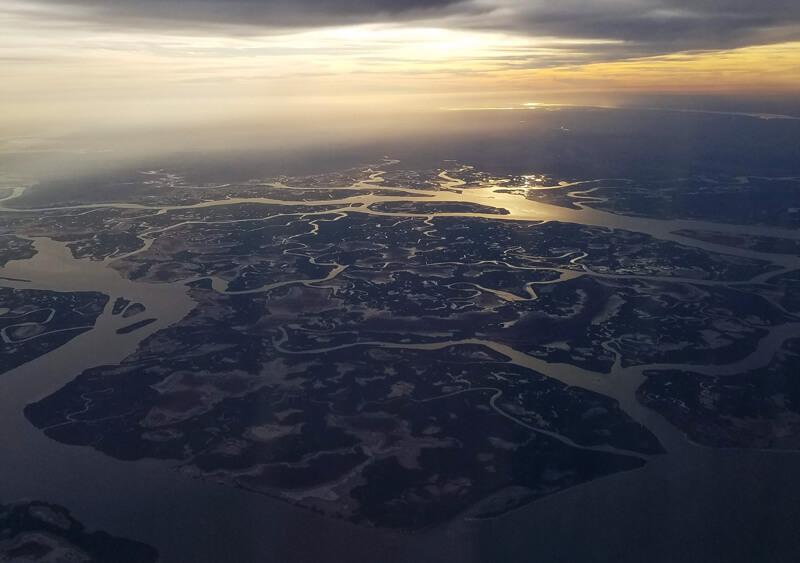
You might look at that photo and wonder where exactly we ride the bikes. All part of the adventure, right? Don’t worry, it’s easier than it looks. In fact, it is some of the best riding on the trip.
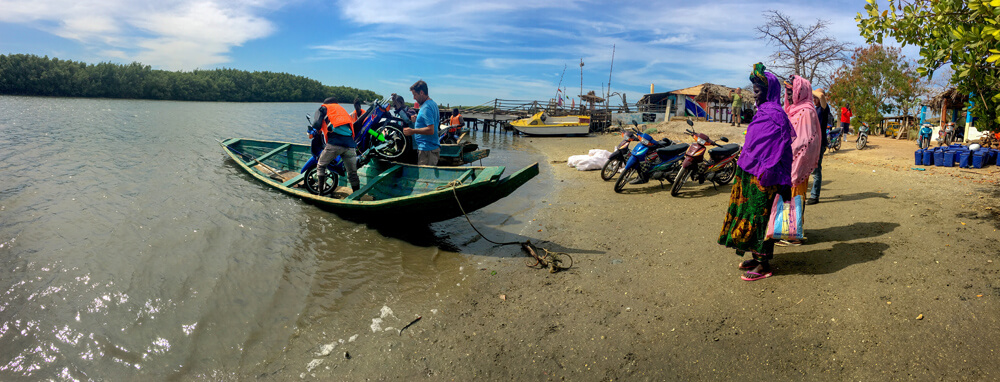
Photo taken by client Penni Gladstone
And when we arrive at our lodging for the night, we will be able to enjoy a sundowner next to the water while sharing stories from a great day of riding.

Photo taken by client Penni Gladstone
The Gambia
Yes, it is The Gambia. As the story goes, this tiny sliver of a country, a former British colony sandwiched inside of Senegal, was often mixed up with Zambia so they added a “The” to distinguish it. There are many other stories wrapped up in Gambia’s history, from the origins of the country itself to Kunta Kinte and Alex Haley’s Roots.
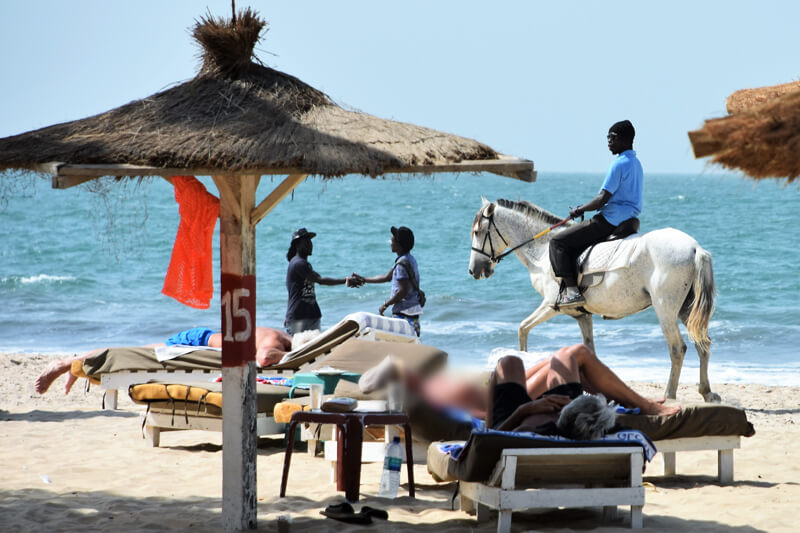
While we will peak our head into the more touristy Kololi/Serrekunda/Senegambia area, with its Caribbean style beaches and its full English breakfasts, we do most of our riding in the Gambia further south, exploring small villages, cruising through the Tandji Bird Reserve, and enjoying terrain that varies with each kilometer. We will ride next to the ocean, into the jungle and into the bush for some true off-roading as we avoid the major highways.
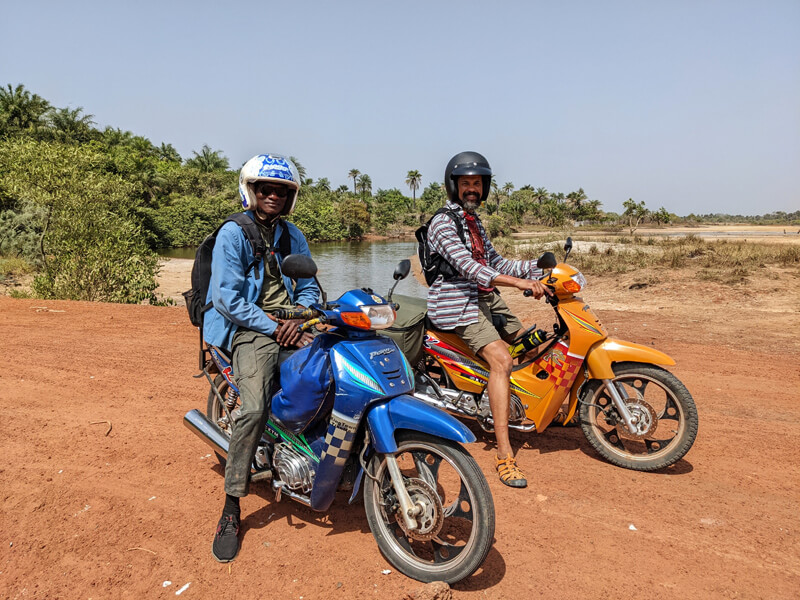
Casamance
We always seem to find ourselves in the orbit of Senegal’s under-visited southern province. The truth is that there are few places in West Africa — let alone the world — like the Casamance. There is the remarkable natural beauty: the towering kapok trees, the miles of untouched beach, the mighty Casamance River. Then there is the unique mix of Diola, Fulani and Wolof cultures along with Senegal’s only recognized animist kingdom.
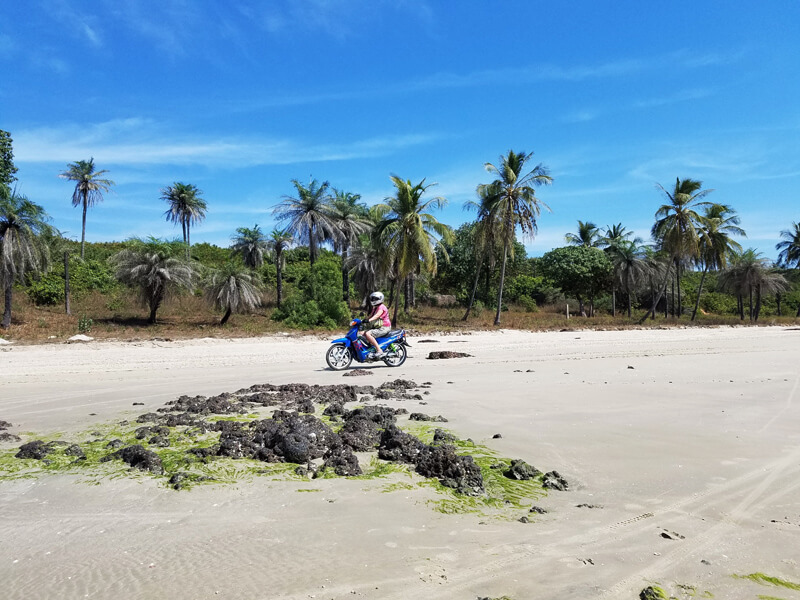
Perhaps more than anything else, it is the warm welcome around every corner that keeps us coming back.
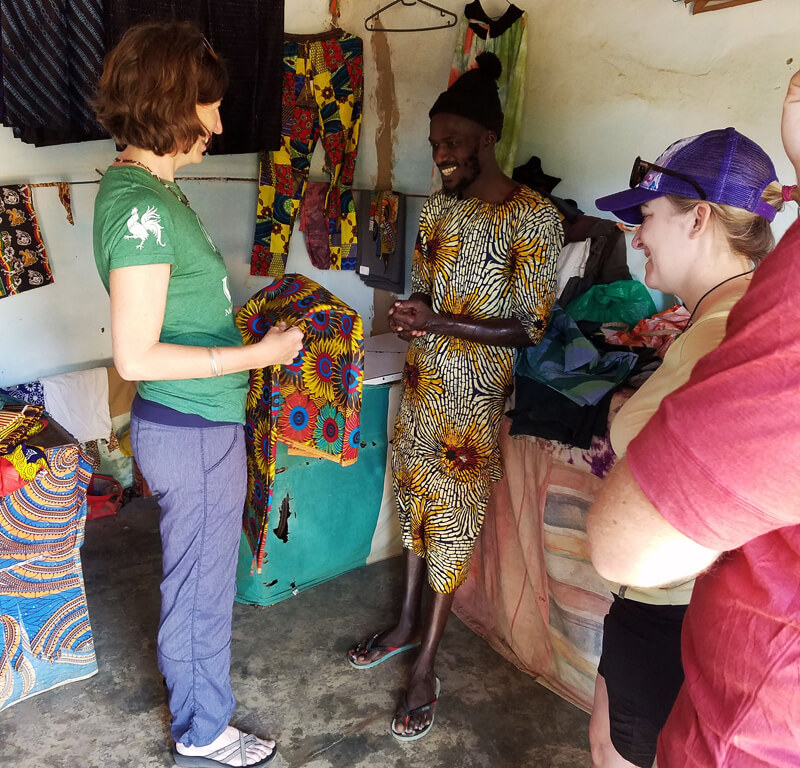
It also doesn’t hurt that there are plenty of optional activities to enjoy as well: swimming, fishing, bird-watching, kayaking, mountain biking, drumming and dance classes or simply relaxing on the beach with a cold beverage.
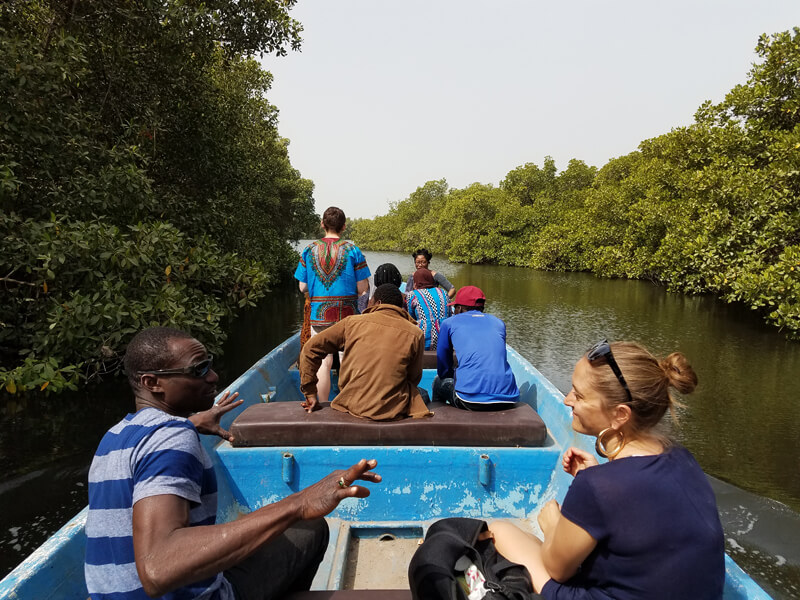
Did we mention the beach ride? Depending on the tides, we can actually ride into Guinea-Bissau territory. On the way, we will likely see more beach cows than people. If you are used to seeing expansive beaches crowded with tourists and resorts, the kilometers of untouched sand may just blow your mind.
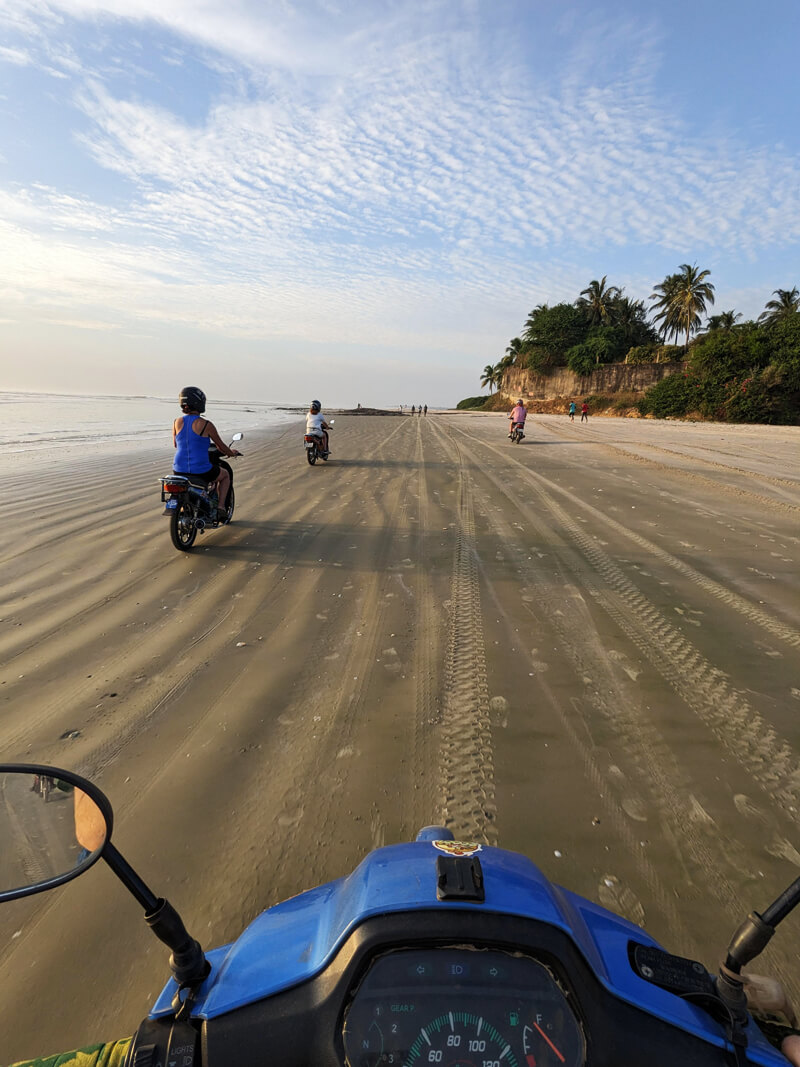
We typically wrap up our time in the Casamance with a visit to Oussouye, Senegal’s only animist kingdom. While Oussouye is subject to Senegalese law, the department is recognized by the government as a semi-sovereign entity.
The scenery – patches of forest punctuated by towering kapoks bursting through the tree-line, all surrounded by rice fields and mangroves – is a draw, but the unique cultural experience will leave the strongest impression.
There are fetishes that act as conduits between the physical and the spiritual realm, and there is a King, who serves simultaneously as a religious and a political leader (see this thread we wrote on the King of Oussouye).
Bissau
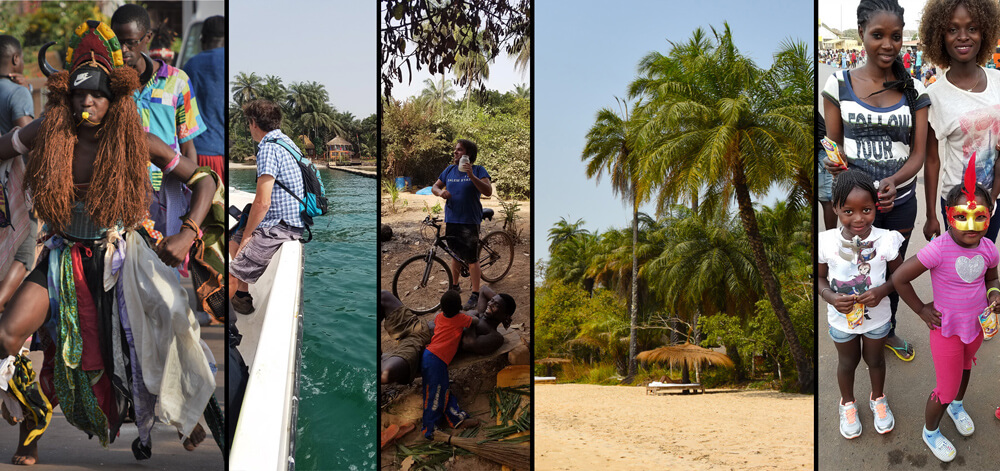
Our ride from the Casamance to Bissau will be the longest of the trip. It will also be one of the most interesting — a distinct transition as we enter our first lusophone country and our third country of the trip overall. It doesn’t take long to notice a change in culture and ambience. Bissau-Guineans know how to have a good time and they will regularly invite you in on the action.
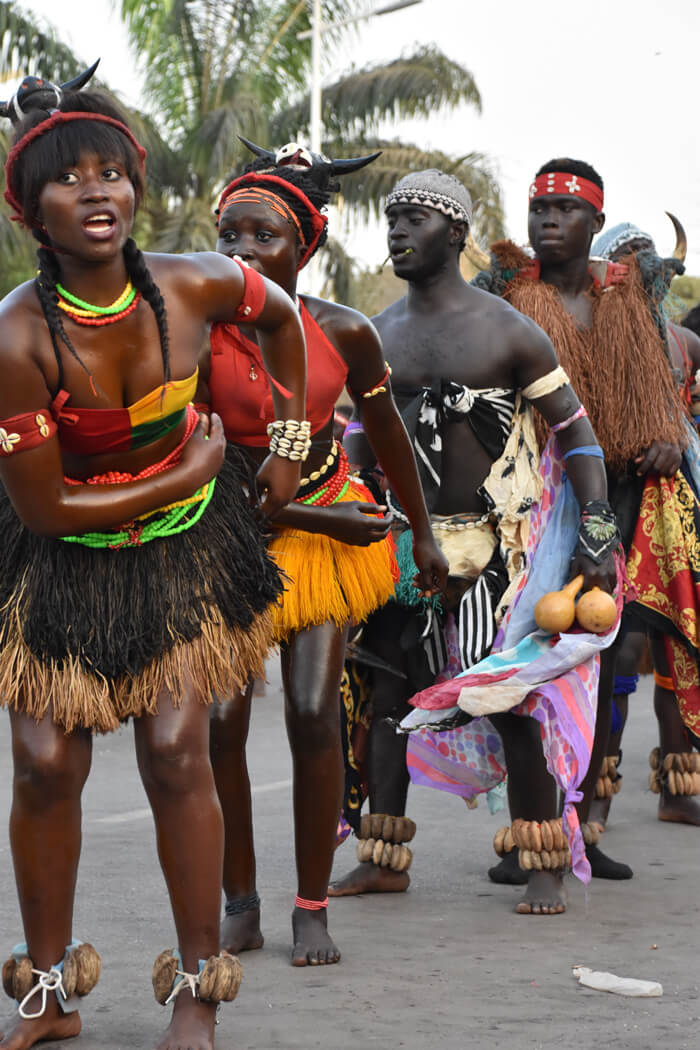
We will be staying near the old city of Bissau, with its decaying and unexpectedly beautiful buildings from the Portuguese colonial period. There will be an optional city tour, which will include the artisanal market, but you may want to just relax at the hotel and enjoy a cold beverage after a long day of riding.
Join us for our favorite party in West Africa!
If you happen to be on our carnival trip, the Bissau experience will be something else. We will spend two days in the capital, walking the streets, watching performances and soaking up the atmosphere. We will get to see cultural troupes from all of Guinea-Bissau’s ethnic groups and even some neighboring countries. Caipirinhas, costumes and face painting will be also on the agenda. There is a reason this has become an annual event for us — Carnival in Bissau is truly one of a kind.
The Bijagos Islands
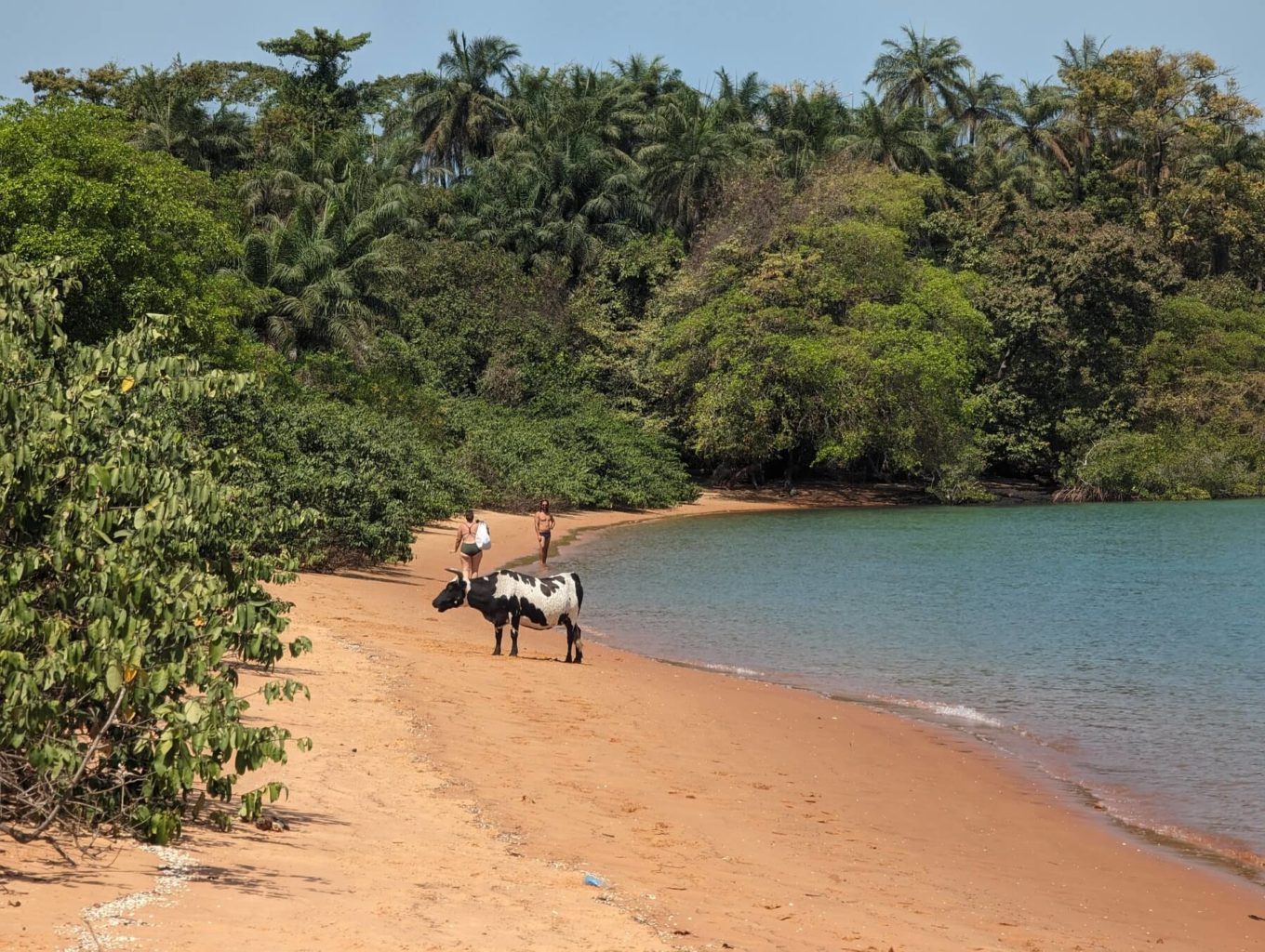
The Bijagos Islands are without a doubt one of the more unique places in the world. The islands are known for their matriarchal societies and cultural independence from mainland Bissau. They are also known for unique wildlife, like salt water hippos, and a thriving fishery. We will have several days on the islands to explore. Fishing, hiking, birdwatching and biking will all be possible, along with simply lazing on the beach.
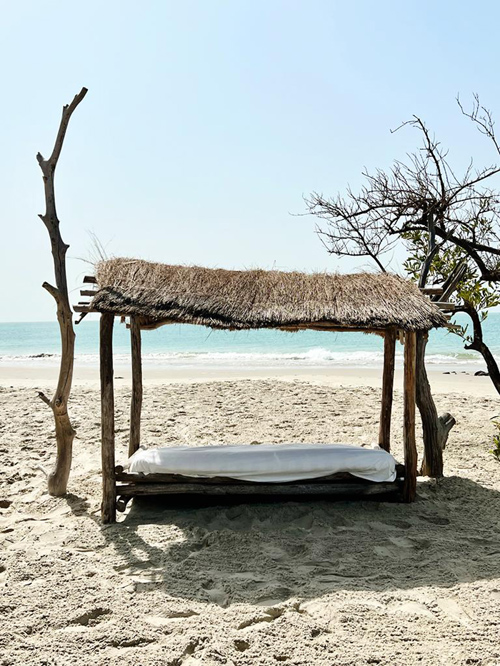
We will not have our scooters on the islands – we cross the channel on a speedboat and it’s not possible to bring the bikes – but we won’t need them. We will have a chance to ride good old fashioned bicycles in order to visit some of Bubaque’s attractions that are beyond walking distance. If that doesn’t sound like your thing, you can hop on the back of a motorized tricycle. On the island of Soga, we will trek through the jungle on flat terrain.
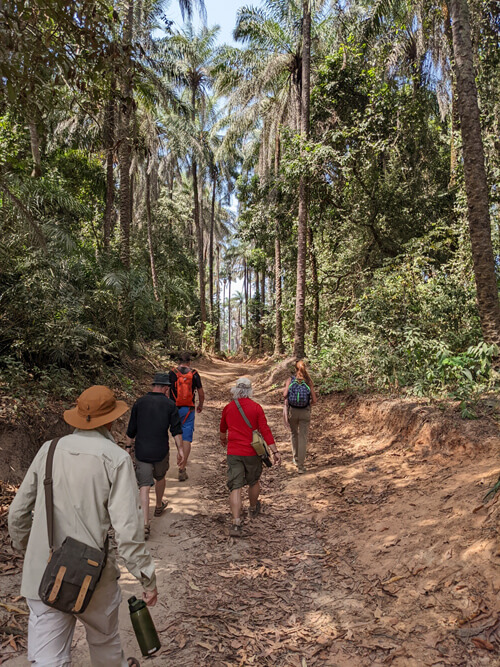
After exploring the Bijagos, we will head back to Bissau, where we will have one more evening on the town before heading inland to Canchungo and Cacheu.
This corner of the country is more verdant, and we will find ourselves under tree cover for much of the ride as the scenery alternates between small villages and subtropical forest. The road into Canchungo itself is framed with centuries old trees, a vestige of the Portoguese colonial administration. These days, conservation in Guinea-Bissau is very much a local effort. There are many communities that have refused new road works and development projects in order to preserve the old growth trees.
We will have a chance to explore village life in Canchungo while staying on the banks of the Rio Baboque, which forms a unique tidal basin that dramatically empties twice a day.
A deep dive into Mandjak culture. An exploration of the nearby mangroves. And some genuine relaxation before we get ready for some of our last riding of the trip.
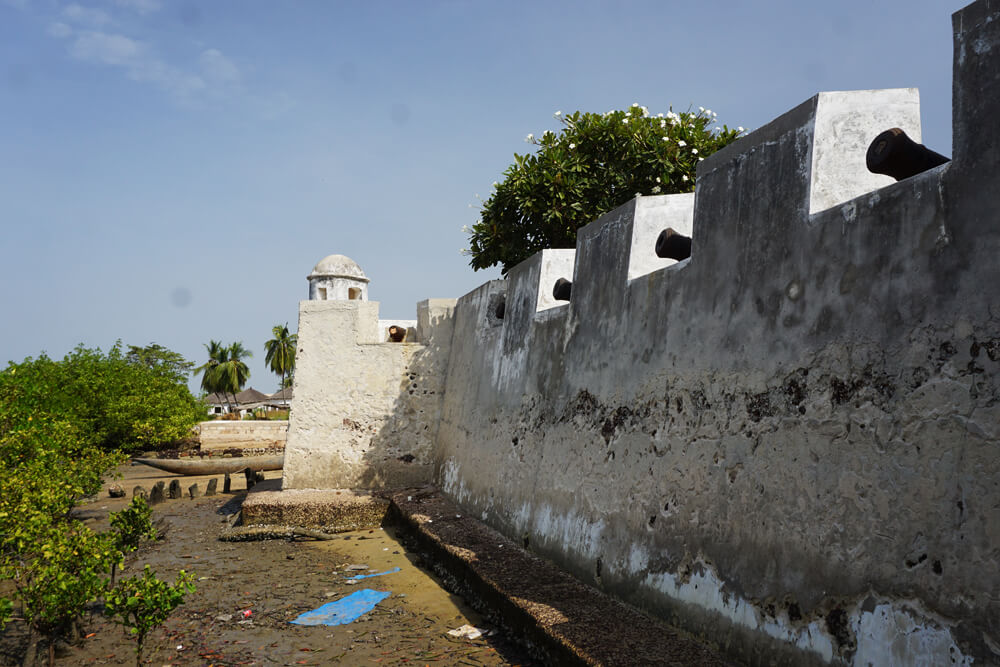
A short 40 kilometer ride from Canchungo is the town of Cacheu, a former slave-trading outpost that lies on the Cacheu River. We will be able to explore Cacheu’s history while also enjoying riverside life before we make our way north to São Domingos and Ziguinchor, where we will spend one last night before wrapping up the trip.
When scheduling allows, we take the overnight ferry back to Dakar from Ziguinchor. The boat has private cabins, a fully stocked bar and restaurant. Cruising down the Casamance River and stopping by the island of Carabane before heading out to the Atlantic, all while dolphins surf in the wake of the boat, is yet another highlight of the trip.
When we are unable to take the ferry, we will end the trip on the Petite-Cote (the “small coast” between Dakar and the Gambian border), on the beach in a laid back village not far from the Dakar airport. Saying farewell won’t be easy, but we will do it in style, with one more sunset on the Atlantic and most likely a few more cold beverages.
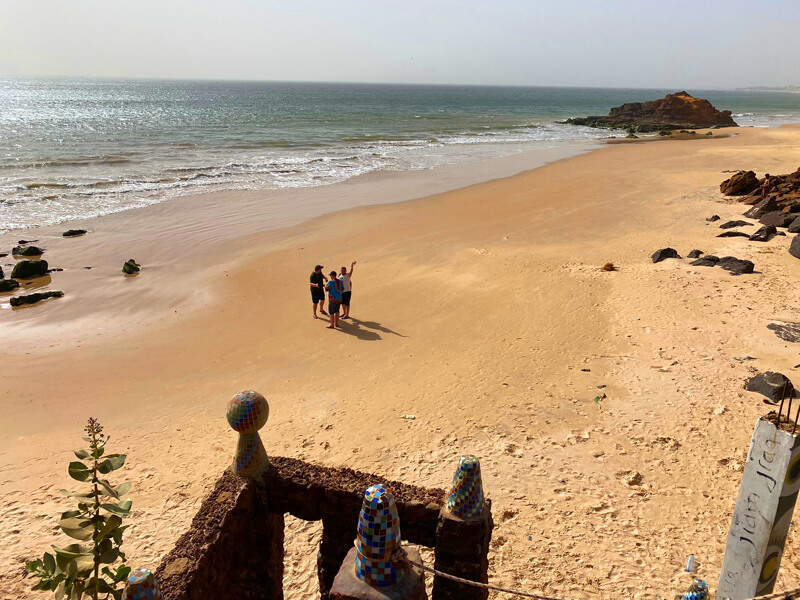
For those extending their trip to visit Dakar or elsewhere, we can advise you on places to visit and things to do. Please see the rubric below for more details about the trip.
Our Travel Philosophy
Travel is privilege. We believe in approaching it with an open-mind and a heavy dose of respect for the local customs and cultural practices that we come in contact with. We believe in discovering a place on its own terms. We do not impose. We listen, and we learn. We are constantly aware that we are visitors. We are guests. And we should act like it.
We are also aware of the positive impact we can have as visitors. We do our best to support local establishments, artisans, guides and organizations that support their families and communities, and in many cases, drive meaningful development. Many of the places we visit receive little to no investment from outside (government or otherwise). We appreciate the fact that we are able to put money into these localities.
What to Expect
From November through February the weather is fairly consistent: lots of sun and persistent dry heat during the daytime. The evenings and mornings can be quite cool. In mid-February-March, the temperature will begin to pick up along with the humidity.
Please have a look at the What to Pack page for tips on clothing and sun protection.
We will be spending time in French, Portuguese and English speaking countries. Don’t speak French or Portuguese? Don’t worry. Many people speak at least a bit of English, and even if you do get stuck, a trip leader will always be close by. You will also have a chance to learn some local languages, such as Wolof, Diola and the Guinea-Bissau Creole.
Wherever possible, we will stay at hotels and guesthouse that introduce us to the local community. We will always choose a family run place over a chain hotel. This trip will have a mix of eco-lodges and hotels/guesthouses. At the eco-lodges, facilities will be limited but the lodging still clean and comfortable. The hotels will have regular toilets, showers, fans and air-conditioning where possible. While the first night in Dakar is not included in the trip price, all other accommodation is included.
This trip has a difficulty of easy to moderate, with a few small stretches of difficult riding in sand. Most of the roads are in good shape, and we will not be sharing the road with any rush hour traffic. In fact, most of the time, we will be sharing the road with cows, kids walking home from school and donkey carts. We will have a few stretches of sand track here and there, but we take it slow. We will also get off road on some laterite and jungle track. Again, we will take it slow and enjoy the ride.
We try to space out our days to avoid spending too much time on the bike at one time. It goes without saying that some rides are longer than others. There are times when you may be hot, uncomfortable, and tired. All we can say is: you are on a scooter trip in West Africa. This is not luxury travel. When we arrive at our accommodation, that cold beverage is going to be that much more enjoyable when you reflect on what you accomplished that day.
On the first day of the trip we will have an orientation with the bikes to get comfortable with them. While we will offer plenty of guidance, you need to have some riding experience before joining us, even if you just spent a day riding a scooter somewhere on holiday.
To go on this trip, you must have a driver’s license, and you need to have a DOT or ECE 22.05 certified helmet (more on this on the Health and Safety and What to Pack pages).
Western style food will often be available, but we will encourage you to try as much of the local cuisine as possible. This particular area of West Africa is a culinary powerhouse, from Senegal’s famous thieboudienne to fresh grilled fish and seafood in the Casamance and Guinea-Bissau. Everywhere we eat, the food is prepared to order and with local ingredients.
Breakfast and a number of group meals are provided. When we are staying at certain lodges, dinner will be included as part of the accommodation. There are several nights on the trip where you will have a choice of where to eat. We will make recommendations, but the food is at your expense in these instances.
Vegetarian and vegan options are limited, but we can make a plan provided you notify us in advance of the trip.
Dakar is one of the most accessible cities in the region. Its airport is served by multiple international carriers. You need to arrive in the city by the evening before the trip begins. While the trip does not begin until the following day, we will have a pre-departure meet-up and orientation. Accommodation for the first night is not covered in the trip expenses (the rest of the lodging on the trip is included). We can make recommendations depending on your budget. For your departing flight, plan to book it no earlier than the afternoon the day after the trip ends.
This trip does have some built in flexibility for the return leg. If another Monday off work is a dealbreaker we can arrange for you to take a flight from Ziguinchor or Cap Skirring that would get you back in time to take a flight on Sunday. This additional flight would be at your cost (a one way flight in 2023 is 90 euro), but we can organize everything for you in advance of the trip.
As far as the trip itself: if you are expecting a by-the-minute schedule that will be respected to the letter, this is not the trip for you. West Africa is a great place for honing your patience and learning how to improvise. It’s important to keep an open mind and be ready for anything. If you have the right attitude, you will learn to love the different challenges that may arise. For more on this, please read about us and our philosophy on itineraries.
Available Dates
These are the current open group trips. There are always more on the way, but you can also contact us if you have particular dates in mind.
Boa Festa! Two Week Trip from Dakar to Bissau for Carnival
Boa Festa! Two Week Trip from Dakar to Bissau for Carnival
The trip price includes all accommodation, breakfasts, transportation and some lunches and dinners. It does not include airfare, any visas needed, optional activities, drinks or restaurant meals.
Cost and Booking Information
The trip cost is €2750 (we do offer a discount for Senegal residents, please inquire). This cost is based on double occupancy lodging. For a single room, there is an additional €150 supplement. To secure your spot on the trip, we take a non-refundable deposit of €250. If you are unable to make it on the trip, you can use this deposit towards a future trip at a later date.
As stated above, the trip cost includes all lodging, transport, and a certain number of group meals during the trip (when they are provided as part of the accommodation). It does not include airfare, visas, optional activities, drinks, and restaurant meals.
If a trip has open spots, we will accept bookings up until departure. For trips that are full, we expect trip payment no later than two months before the trip starts. Please see our page on trip policies and cancellations.
